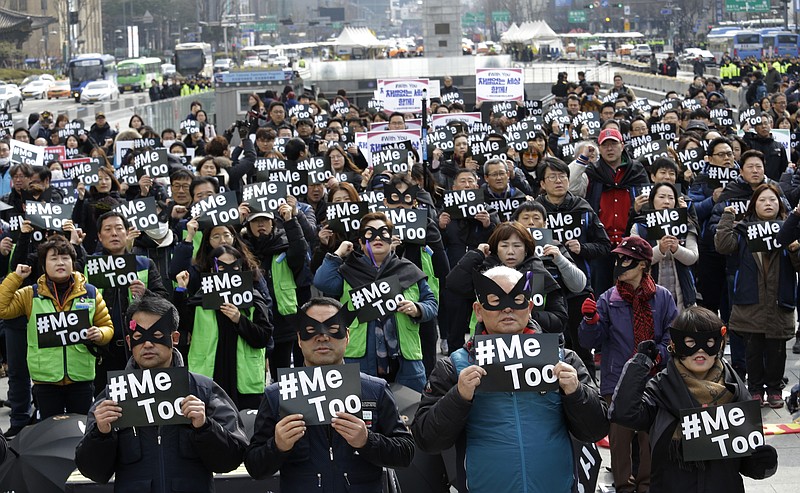MANILA, Philippines (AP) - Protests against the Philippine president, a surging #MeToo movement in South Korea and a call by Myanmar's female leader for women to use their strength marked International Women's Day on Thursday, as marches and demonstrations kicked off around the world.
Hundreds of activists in pink and purple shirts protested in downtown Manila against Philippine President Rodrigo Duterte, calling him among the worst violators of women's rights in Asia. Protest leaders sang and danced in a boisterous rally in Plaza Miranda, handing red and white roses to mothers, sisters and widows of drug suspects slain under Duterte's crackdown on illegal drugs.
Myanmar's leader Aung San Suu Kyi urged women to build peaceful democracies using their strength in politics, economics and social issues. In Europe, protesters in Spain got an early start, launching a 24-hour strike during which women have been called on to stop working, whether at the company or at home.
And in China, students at Tsinghua University used the occasion to make light of a proposed constitutional amendment to scrap term limits for the country's president.
One banner joked that a boyfriend's term should also have no limits, while another said, "A country cannot exist without a constitution, as we cannot exist without you!"
China's ceremonial legislature is poised to pass a constitutional amendment that will allow President Xi Jinping to rule indefinitely during its annual session. Photos of the students' banners, like other content about the proposed amendment, were quickly censored on social media.
Hundreds of South Koreans, many wearing black and holding black signs reading #MeToo, rallied in central Seoul. They called for bringing alleged sex offenders to justice, as well as action on issues such as closing a gender pay gap.
Since a female prosecutor's revelation in January of workplace mistreatment and sexual misconduct, South Korea's #MeToo movement has gained major traction. The list of women who speak out is growing day by day.
Several high-profile men have resigned from positions of power, including a governor who was a leading presidential contender before he was accused of repeatedly raping his female secretary.
Suu Kyi's speech marked the third International Women's Day celebrated in Myanmar under a civilian government. She led her party to a landslide victory in 2015 elections and leads the government even though the country's constitution bars her from the presidency.
"A country's human rights values will be enhanced when women are granted their rights," she said. "Also by using women's strength and ability, it will be supportive to the development of the economy as well."
Philippine protesters condemned the thousands of what they say were extrajudicial killings, which the police deny.
Protest leader Jean Enriquez also railed against Duterte's anti-women remarks saying: "We're so alarmed. We have seen his direct attacks on women under his iron-hand rule and it's now time to heighten our resistance."
Human rights groups have condemned Duterte's sexist remarks, including one where he asked troops to shoot female communist rebels in the genitals.
Other International Women's Day events are planned across Asia, the Mideast, Europe and the Americas.
